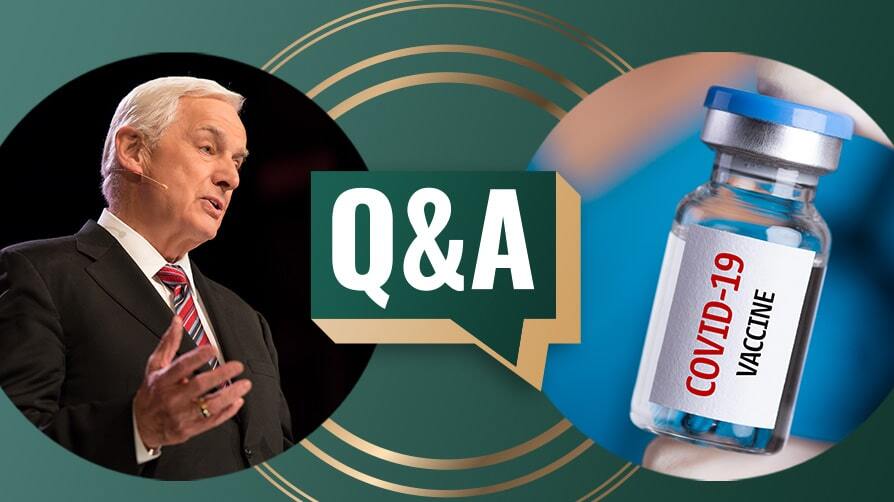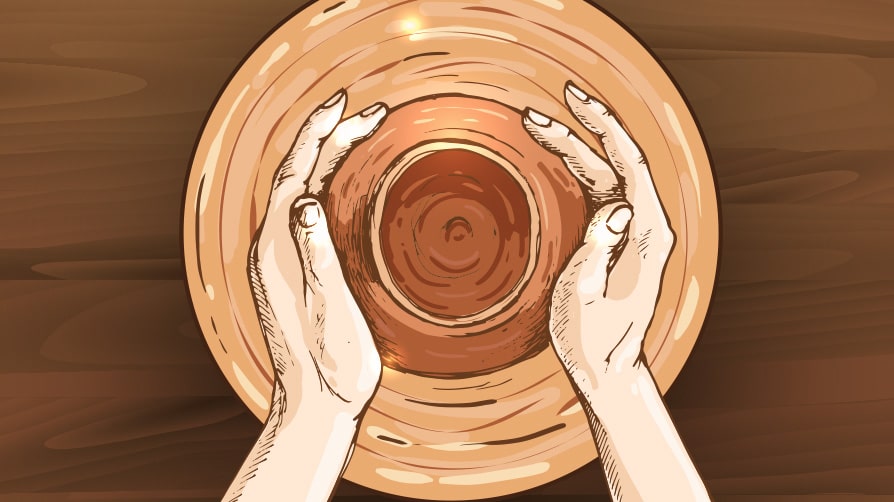Imagine you are a senior faculty member at a well–known graduate school of Christian theology and ministry. One day, in a curriculum planning meeting, you and several of your colleagues are discussing the question: “What is the central theme of the Bible?” Several answers are offered—the Kingdom of God, redemption, reconciliation, unconditional love, and more. The others turn to you: What would you say?
While all those suggested themes are worthy of consideration, there is another idea that rarely is considered: stewardship.
I know—your first thought might be, You’re suggesting that tithing might be the central theme of the Bible? No, I am not. But the fact that tithing, or financial management, is the first idea that comes to mind when we hear “stewardship” indicates just how narrow our view is. In fact, stewardship is much bigger than how we manage the money God has entrusted to us. Stewardship is such a large, overarching idea in Scripture that it could easily be a candidate for the Bible’s central theme—or at least one of the central themes.
{ms_advert_8_box}First, let’s consider stewardship by defining steward. You might remember that airline flight attendants used to be all female, and they were called “stewardesses.” Why? Because they were the airline’s representatives to the passengers on the plane. They had a commission from the airline: Take care of the passengers; manage the cabin; look after everything the way we (the owners) would if we were in your place.
A steward is a manager, an overseer, a representative with responsibilities.
A steward is a manager, an overseer, a representative with responsibilities. A steward sets their desires aside to carry out the wishes of the boss/master/owner/lord. And we see that idea throughout Scripture.
Stewards From the Bible
- In Genesis, Adam and Eve were created in God’s image and set upon earth to have dominion (stewardship) over all creation (1:27–28). They were to represent God throughout creation, reflecting God’s will into creation and reflecting the glory of creation back to God.
- Joseph was made the steward over the household and affairs of an Egyptian official named Potiphar (Genesis 39:1–6). Potiphar entrusted everything to Joseph. All Potiphar did was show up for his meals, and Joseph handled everything else in a manner that would please his master (verse 6).
- During His three years of ministry on earth, Jesus was a servant–steward of God’s commission to redeem and reconcile humanity. Jesus set aside all His own desires (Philippians 2:5–8) and focused exclusively on the Father’s will (John 4:34; 5:19, 30; 6:38; 7:28–29).
- Paul was made a steward of the Gospel and the grace of God to the non–Jewish world (Acts 22:21; 1 Corinthians 4:1; Ephesians 3:1–9).
- Church leaders are to be a “steward of God” to care for the souls in the churches they lead (Titus 1:7).
Do you remember the campaign among Christian youth in the 1990s where they wore bracelets inscribed with WWJD? Those letters stood for “What Would Jesus Do?” That is the central question the steward of God always asks. Regardless of the situation, a steward sets aside their own preferences and plans and says, “Lord, I’m here to do Your will. What would You have me do in this situation?”
More Than Money
And not just in financial situations. We are to be stewards of our moral and ethical life, our health, and our time and talent, as well as our treasure. We’re also to be stewards of our relationships—all of them: family, friends, neighbors, coworkers, and strangers. We are to do for others whatever God would do for them if He were in our place. We are in those relationships for His glory. Paul wrote that only one thing is required of stewards—faithfulness (1 Corinthians 4:2). God is pleased with faithful stewards (Matthew 25:14–30).
God owns us and has entrusted to us all we are and have (1 Corinthians 6:19–20). As stewards, our mission is to manage our life in a way that is well–pleasing to Him. As we are faithful in that mission, God continues to entrust more and more of life to us.
How does your life measure up as a steward of God?
How does your life measure up as a steward of God? Is everything you are and possess being used for the Master? Are you living as the Lord Himself would live in your place? Consider what your life would be like if you moved your stewardship from good to great.
This article originally appeared in the May 2019 edition of Turning Points devotional magazine.
{ms_advert_2_row}I need help

Your response has been received, and we will be praying for you.
Look for answers to some of the most common questions in the weeks ahead.
In his book Buried Treasures of Texas, W. C. Jameson told of a wagon train that crossed North Texas in the 1800s. Seventeen wagons of pioneers from the East wanted to start a new life in California. Just as they entered Clay County, a party of Comanches attacked them with rifles and well–aimed arrows. The wagons formed a circle as the pioneers grabbed their rifles and sought cover. The raiders were driven off but later regrouped and attacked again.
One man—his name is lost to history—hid between trunks in one of the wagons, and during a lull in the fighting he jumped out and ran away. From a distance, he watched the wagons burn as all the pioneers were scalped. The lone survivor nearly died of thirst, but he found a damp spot in the ground where he began digging with his hands. Soon he had some muddy water to drink, but he found something else. Several gold nuggets were buried in a rotten pouch. He surmised that someone else had fled the same route, found the damp earth, and hidden the saddlebags of gold.
The man carried away as much gold as he could. But it was too heavy, and he buried some of it again, marking the spot. As he continued traveling, the remaining gold was still too heavy, so he stopped several more times to bury and mark his treasure. Three days later, he staggered into a little town and shared his story. He had only a few small nuggets left. When the man was well enough to go back for his gold, he was never able to find it. Disappointed and frustrated, the man settled in Wichita Falls and died distraught several years later.1
{ms_advert_6_box}It’s amazing how gold, silver, houses, land, electronics, and the material accumulations of life can bog us down, frustrate us, and even ruin our life. How important to understand the priorities of life! Nothing is really ours. We’re travelers on the way to heaven. If God gives us some gold, it doesn’t belong to us. If we prosper, it’s not for our selfish benefit. If we suffer loss, it’s not unknown or unexpected to God.
The important thing is learning to hold our possessions loosely, to keep them under God’s control, to be generous, and to guard against hoarding. When our pockets are too full, it hinders us. Managing all we’ve accumulated becomes a full–time job. We can become so full of material concerns that it’s difficult to receive the true abundance God wants to bestow.
What Jesus Said About Money
Jesus warned about this on multiple occasions.
In His Sermon on the Mount, He said, “Do not lay up for yourselves treasures on earth, where moth and rust destroy and where thieves break in and steal; but lay up for yourselves treasures in heaven” (Matthew 6:19–20). I don’t believe He was telling us it’s wrong to save for the future or have bank accounts. He was saying that money and the acquisitions of life should never dominate our affections. He continued, “No one can serve two masters…. You cannot serve God and mammon” (6:24). If God occupies the throne in the middle of our heart, then we’ll be able to keep material wealth—or its absence—in a healthy perspective.
A few chapters later in His Parables of the Kingdom, Jesus talked about the sower who cast out his seed. Some landed among weeds and thorns. The seed sprouted but was choked by the briars. The Lord explained, “Now he who received seed among the thorns is he who hears the word, and the cares of this world and the deceitfulness of riches choke the word, and he becomes unfruitful” (Matthew 13:22).
Don’t be so absorbed in the material that you can’t receive the spiritual.
Read that again! That’s an apt picture of many Christians in the western world. They’re so distracted by the things they’ve accumulated (and the heavy burdens connected with them) that they have little energy left for the work of the kingdom. They have too much to hold on to.
A few chapters later, Jesus brought up this subject again, this time in connection with a rich young ruler who wanted to follow Him as His disciple. Jesus told him to sell all his possessions and give away his money to the poor, and then he could become a disciple. “But when the young man heard that saying, he went away sorrowful, for he had great possessions” (Matthew 19:22). Whenever we read this story, I think a lot of us have a nagging question. Does Jesus really want us to liquidate our bank accounts, sell everything we have, give it all away, and live in poverty?
No, not necessarily. This incident happened as Jesus was on His way to be crucified. These were the last days of His earthly ministry. He knew that after His death, persecution would descend upon the Early Church and the believers would be driven away to the four winds, bearing the Gospel to all the world. In this case, Jesus knew it would be better for the young man to divest himself of all his financial ties.
It’s the same advice Paul gave the Corinthians who were facing persecution: “Those who… buy things should not be absorbed by their weeping or their joy or their possessions. Those who use the things of the world should not become attached to them. For this world as we know it will soon pass away” (1 Corinthians 7:30–31, NLT).
That’s what I want to tell you in this article. If you buy something, don’t be absorbed by it. If you use the things of this world, don’t become too attached to them. God has more for you. He has a richer future for you. He has an inheritance for you. He promises an abundant life, which goes far beyond your financial balance sheet. We should hold things loosely and avoid having too much to hold on to. Don’t be so absorbed in the material that you can’t receive the spiritual.
What We Should Do With Our Money
How do we maintain the right balance between our financial balance sheet and our faith?
First, figure out if you’re living among the thorns and if the cares and concerns of your possessions are choking your spiritual growth. Take a piece of paper and draw a circle, representing your life. In the center of the circle, draw a smaller circle. Take your primary possessions and, using symbols, scatter them between the two concentric circles. Draw a small house for your residence. Use a dollar sign for your bank accounts. Draw a small car for your vehicle, and so forth.
Now, see if you can truthfully write the name of Jesus in the small circle. Is He really the hub of your life? Is He Lord of all the rest? Does everything sincerely revolve around Him? Are you using all you have for His glory? And one last question: Are you perfectly willing to erase everything in your drawing except for Him if that’s His will?
Second, see if there’s anything in your drawing that needs to be under His control in a greater way. Can you better use your home for His glory? What about your car? What about your money? Are you really laying up treasure in heaven? Are there things you need to sell or give away?
Third, before adding anything more to the circle—that is, before making another big purchase—pray about it earnestly. Sometimes we need to upgrade some area of our life, but the Bible also tells us, “And having food and clothing, with these we shall be content” (1 Timothy 6:8). Are you content with what you have? It’s a good idea to even pray about small purchases: “Lord, should I buy this?” That should become a standard prayer in our life.
What’s holding you back from receiving all that God has for you? Don’t be guilty of packing your pockets so full of gold that you can’t make the journey set before you. And don’t be so frustrated at losing your treasures that you worry yourself to death.
What’s holding you back from receiving all that God has for you?
The Bible sums it up like this: “Command those who are rich in this present age not to be haughty, nor to trust in uncertain riches but in the living God, who gives us richly all things to enjoy. Let them do good, that they be rich in good works, ready to give, willing to share, storing up for themselves a good foundation for the time to come, that they may lay hold on eternal life” (1 Timothy 6:17–19).
This article originally appeared in the November 2019 issue of Turning Points devotional magazine, a ministry of Turning Point with Dr. David Jeremiah.
Sources:
1W. C. Jameson, Buried Treasure of Texas, Little Rock: August House Publishers, Inc., 1991), 88–91.
{ms_advert_8_row}Money management may be one of the most misunderstood aspects of the Christian faith. How often have you heard someone say, “Money is the root of all evil?” Did you know that statement doesn’t appear anywhere in the Bible? It is a misquotation of 1 Timothy 6:10, which says, “The love of money is a root of all kinds of evil” (emphasis added).
It is not wrong for Christians to have money, even a great deal of it. Financial resources are a tool God gives us to accomplish a lot of good in this world.
The problem is our relationship with money. Later in 1 Timothy 6:10, the apostle Paul says, “Some have strayed from the faith in their greediness, and pierced themselves through with many sorrows.” If we want to manage our finances wisely, we can start by evaluating our heart and our motives. Let’s look at five financial principles from King Solomon, the ancient world’s wealthiest and wisest man.
{ms_advert_7_box}1. The More We Have, the More We Want
He who loves silver will not be satisfied with silver; nor he who loves abundance, with increase. This also is vanity. Ecclesiastes 5:10
According to Forbes, Elon Musk unseated Jeff Bezos as the richest person in the world as of January 2021. Thanks to Tesla’s rising stock values, Musk’s net worth rose to $189.7 billion compared to Bezos’ $185 billion Amazon fortune.1 If you were to meet either of these men and discuss their dreams, you would probably discover that they are focused on getting more, particularly as more can be equated with their happiness.
From the migrant farmworker to the middle–class accountant, we always seem to want more.
But it’s not just the wealthy who want more. From the migrant farmworker to the middle–class accountant, we always seem to want more. The fire is fed but never quenched. The more we get, the more we want, and our happiness gradually slips away.
Jesus said, “Take heed and beware of covetousness, for one’s life does not consist in the abundance of the things he possesses” (Luke 12:15). Wouldn’t it be wonderful to be truly content? To free ourselves of the burden to accumulate more possessions? To be at peace with our place in life? Why do we make ourselves miserable over something with a lousy track record for satisfaction?
Contentment fueled Paul’s incredible power in ministry. He testified, “I have learned to be content whatever the circumstances. I know what it is to be in need, and I know what it is to have plenty. I have learned the secret of being content in any and every situation, whether well fed or hungry, whether living in plenty or in want” (Philippians 4:11–12, NIV)
2. The More We Have, the More We Spend
When goods increase, they increase who eat them; so what profit have the owners except to see them with their eyes? Ecclesiastes 5:11
When we receive a promotion with a generous raise, a wise choice would be to maintain our current lifestyle and apply the extra money to savings and charity. But before we know it, we often find ourselves imagining new cars, new furniture, and perhaps a second home. More money flows through our account each month, but our spending increases by the same amount.
The New Living Translation renders Ecclesiastes 5:11 this way: “The more you have, the more people come to help you spend it. So what good is wealth—except perhaps to watch it slip through your fingers!” Author William MacDonald says, “When a man’s possessions increase, it seems there’s a corresponding increase in the number of parasites who live off him: management consultants, tax advisers, accountants, lawyers, household employees, and sponging relatives.” The problem of fair–weather friends existed in the days of Solomon, and it continues to this day.
For many of us, the problem is not our income but our expenses.
3. The More We Have, the More We Worry
The sleep of a laboring man is sweet, whether he eats little or much; but the abundance of the rich will not permit him to sleep. Ecclesiastes 5:12
When wildfires began approaching my neighborhood several years ago, the order came to collect our valuables and evacuate our homes. Driving down the hill from our house, I turned to my wife, Donna, and said, “Do you realize it only took us ten minutes to collect our valuables? Everything else is just ‘stuff.’”
When you can fit all your life’s valuables in the backseat of your car, you can sleep well at night. By God’s grace, I can say I’ve never lost a night’s sleep over the status of my investments. Many people believe that the more money they have, the happier they’ll be, and the more soundly they’ll sleep at night, but the opposite is true. The more they get, the more they worry about preserving it.
If money is your source of strength, you’ll spend all your time worrying about what will happen when your defenses fail.
If money is your source of strength, you’ll spend all your time worrying about what will happen when your defenses fail. A far better choice would be to put your faith in an impenetrable Shield and Protector, the One who has said, “I will never leave you nor forsake you” (Hebrews 13:5).
When he was 53 years old, John D. Rockefeller was the world’s only billionaire. His income was $1 million per week. But he was a sick man who lived on crackers and milk and could not sleep because he worried so much about his money. Eventually, he learned how to give his money away, and his health improved radically. As a philanthropist, he lived to celebrate his 98th birthday.
Elderly couples reminisce about their box–of–macaroni days in a tiny apartment. They conclude that those may have been the best times in their marriage. The Great Depression was a terrible time for people, yet many folks remembered those same years fondly.
Financial difficulties flush us out of self–satisfied isolation. They force us to go out and meet people and to need some of them. As we grow more prosperous, there is a tendency to draw away from the community. We miss a lot of the little graces and relational encounters that make life real and satisfying. Rather than enjoying a taste of true happiness, we substitute trinkets that never live up to their shiny allure.
4. The More We Have, the More We Lose
There is another serious problem I have seen under the sun. Hoarding riches harms the saver. Money is put into risky investments that turn sour, and everything is lost. In the end, there is nothing left to pass on to one’s children. Ecclesiastes 5:13–14 (NLT)
Some of us experience this principle when we make large investments that lead to anxiety. Anyone who has ever bought a home for the first time is familiar with this. One day we are celebrating a new chapter in life, and the next, we are scraping the bottom of our checking account to pay a plumber or roofer. As our possessions increase, we find that we have more to lose. And soon, our happiness, joy, and personal peace depend on how protective we are of our possessions.
Other temptations are more insidious. We might not buy a big house or a new car, but we may indulge our taste buds whenever we sit down to eat. Afflictions like type 2 diabetes and coronary heart disease have earned the label “diseases of affluence” because they are associated with chronic over–nutrition and obesity—conditions virtually unheard of in the developing world. Good stewardship begins with our day–to–day decisions.
What does God intend for me to do with these resources?
When God entrusts us with wealth, He is endowing us with a responsibility to share with others. A good question to ask ourselves is, What does God intend for me to do with these resources? If He does not make the answer immediately apparent, our best decision is to wait for Him to reveal His plans as we study the Bible and pray.
5. The More We Have, the More We Leave Behind
We all come to the end of our lives as naked and empty–handed as on the day we were born. We can’t take our riches with us. And this, too, is a very serious problem. People leave this world no better off than when they came. All their hard work is for nothing—like working for the wind. Throughout their lives, they live under a cloud—frustrated, discouraged, and angry. Ecclesiastes 5:15–17 (NLT)
To put it another way, you can’t take it with you. It’s just common sense. Beyond the price tag, we pay for the things we accumulate with sweat and toil. Our effort is exchanged for money, which is exchanged for goods. Even so, we never own anything permanently; we only rent it until we pass from this earth. One day our precious possessions, even if they outlast us, will belong to someone else.
The flip side of that coin is positive: Bequests to charities, Christian ministries, and individuals have the potential to catalyze positive change in our world. Accumulation can work hand in hand with goals for God’s Kingdom. In eternal terms, we only need to remember that there is no own—only loan. And the more we give away, the less we worry, and the more happiness we can find here. Jesus tells us to “lay up for yourselves treasures in heaven, where neither moth nor rust destroys and where thieves do not break in and steal. For where your treasure is, there your heart will be also” (Matthew 6:20–21).
One way to experience satisfaction in this life is to make investments in the next.
One way to experience satisfaction in this life is to make investments in the next. We can access a risk–free portfolio through our tithes and offerings.
What is the best investment strategy? One that focuses on eternal dividends. Earthly treasures will never satisfy us or bring peace. They may not even survive the next economic downturn. But investing in God’s Kingdom offers an exponential return on our investment. Matthew 6:33 says, “Seek first the kingdom of God and His righteousness, and all these things shall be added to you.”
Sources:
1Sergei Klebnikov, “Elon Musk Is Now the Richest Person In The World, Officially Surpassing Jeff Bezos,” Forbes, January 8, 2021, https://www.forbes.com/sites/sergeiklebnikov/2021/01/08/elon–musk–is–now–the–richest–person–in–the–world–officially–surpassing–jeff–bezos/?sh=66cf48c33b86, accessed on January 13, 2021.
{ms_advert_2_row}











